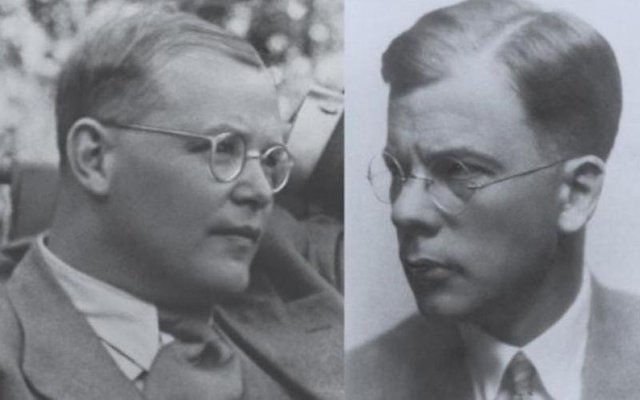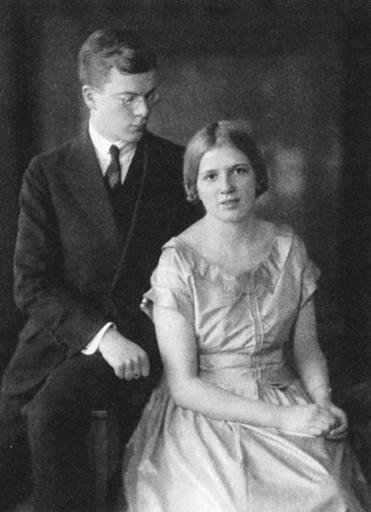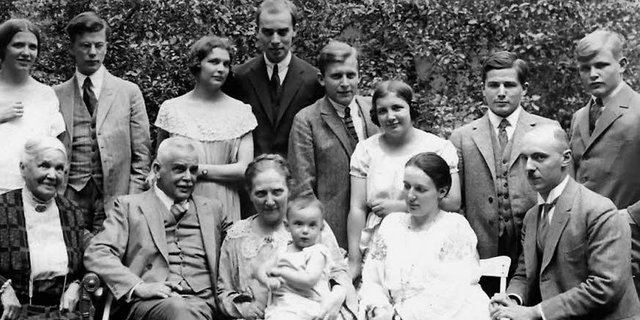A couple of years back I was sitting next to my aunt in the Royal Albert Hall in London, waiting for a classical concert that was about to start. She had invited me to come along to a concert of one of her employers, something that she does more often. She has always organized concerts and managed other organizational tasks for many different – but often quite interesting – people. Being her niece, I’m used to hear her stories (on which I will write a different piece some other time) about the many adventures she has had while traveling the world meeting the rich and the famous. Most often of course, I don't know exactly who these people are, because no last names or precise job descriptions are mentioned. This time however, a minute before the concert started, she whispered something in my ear that made it quite hard to focus on the rest of the concert.
While the German director took the stage and was greeted by a large welcoming applause, my aunt leaned over to my side and shared the following words: “The father of the director – my employer – has tried to kill Hitler, and when word got out, Hitler ordered him to be hanged by piano wires.”
And then the concert started and I couldn’t ask anything for a couple of hours. What did she just say to me? Who was I looking at?
Growing up with a mother still biased against Germany, since her grandfather came back from Auschwitz, this was the first time I heard or got to meet someone who was related to someone that got so close to the point of possibly turning the course of history. I vowed to myself – trying to restore my focus to the music – that I would find out what the story was of the father of this director, who turned out to be called: Hans von Doghnanyi.
The story is about Hans von Doghnanyi, his best friend Dietrich von Bonnhoefer, and Dietrich’s sister who was also Hans’ wife: Christine von Bonnhoefer. They all understood what evil was coming for Germany when Hitler rose to power in the early 1930s. All three held faith and used the best of their abilities to oppose the system. Hans via the jurisdiction, Dietrich via his Christian faith, and Christine being their closest ally.

(Dietrich and Hans)

(Hans and Christine)
Dietrich, the most famous of the three to this day, who was born in 1906, grew up in Berlin and knew from the age of 14 that he wanted to become a vicar. By the time Hitler came to power, he had travelled the world and was ordained and working for the church. When Nazi propaganda released its ideology also on the church, it was Dietrich that fought to protect the German Protestant churches from being molten together. Unifying the different German churches in one German Christian faith would generate extra support to get rid of Jewish elements and it would be a strong tool to rule the people of Hitler’s Third Reich. During this moral Kirchenkampf, Dietrich wrote in a controversial essay to the church leaders who adopted the Nazi's view, that the church is “neither to praise nor to censure the laws of the state” and that the church had an “unconditional obligation towards the victims of any ordering of society, even if they do not belong to the Christian community”; in any case a “baptized Jew is a member of our church”.

(Hans 3rd of left, with the 'von Bonnhoefer' family)
Hans von Dohnanyi was a son of an Hungarian composer and a mother who was a piano player. Hans knew Dietrich from a very young age. They both grew up in Berlin and would become brothers-in-law after Hans got married to Christine. After Hans got his doctorate in Law in 1925, his career started at the Reich Ministry of Justice, where his outstanding brilliance and integrity did not go unnoticed. He would work as a personal consultant to several justice ministers. Since 1923, he already felt resistance against the Nazi’s, due to the thuggish and narrow-minded behaviour of Nazi students on campus. But as Hans’ career brought him to higher ranks, his resistance started to grow and become increasingly active in secret. After the ‘Night of the Long Knives’ in 1934, an event that would show the real face of the Nazi’s, justifying the killings of some high Nazi officials for the establishment of total power, Hans and Dietrich quickly grew a pact together with various other government officials. Hitler had to be stopped.
From then on, while working at the Ministry of Justice, Hans would save all documents that showed the regime’s crimes and the violations that they were guilty of. He knew and saw what was happening to the country. So in case the Nazi's would lose power, he would have evidence to prosecute those who committed crimes. The documents would be stored in a safe in the Zossen military base of the Wehrmacht in Berlin. Hans would call this documentation the Chronicles of Shame, only him, Dietrich and Christine knew about. In the years that would come, the perverse nature of Hitler’s ideology would see more light of day, together with Hitler's aspirations to go to war to create one big German Reich.
Shortly before the war started, Hans would be called into the Abwehr of de Oberkommando of the Wehrmacht, by Colonel Hans Oster and Admiral Wilhelm Canaris. Two important people for the resistance. Hans would make sure Dietrich would get a position at the Wehrmacht too, so he wouldn't have to fight on the front. Hans would work as a deputy for Oster, collecting intelligence where and when necessary. Together, Hans, Dietrich, Hans Oster, Chief of Staff Ludwig Beck and Canaris, would try to sabotage Nazi's plans to the best of their abilities. Foreseeing the eventual fall of Hitler, Dietrich would travel throughout Europe to form connections with Western Allies, sending messages to the British government.
In February 1943, after big defeats in the East for the German army, the group of now 26 high-ranking men – later called the “Schwarze Kapelle”(Black orchestra) by the Gestapo – that were part of the resistance, knew it was time to come in action. Before, getting rid of Hitler would have had no effect since the whole country was mobilized enough to continue on its own. But now, with the increase in chaos the German people seemed more ready for it, since they had suffered too many losses.
Hans then became involved in planning the assassination attempt on Hitler. It was hard to get close to the Fuhrer, as he often changed his schedule for security reasons and most of the time retreated to his Wolf Liar in Bavaria. But a window of opportunity arose when news came Hitler would visit the Eastern front and would then fly back from Smolensk to Germany. A bomb, initially seized by the Gestapo from a discovered British special operations unit would make the plan work. To make sure it would arrive safely, Hans himself flew to Smolensk to deliver the package by sitting on top of it throughout the flight. Upon arrival, his co-conspirators would then disguise the bomb as two bottles of Cointreau and smuggled it into Hitler's private plane when he travelled back to Germany. Although the bomb was tested many times, and should have worked, the low temperature in the baggage compartment of the plane probably made the fuse of the bomb too cold to work. The plane landed safely, the mission had failed.
A month later, Hans Christine and Dietrich were arrested by the SS. Hans at his office, and Christine at home while Christoph (then 13 years old) watched it happen, and stayed home alone. A few years earlier, Hans had saved 14 Jewish people from deportation, disguised them as Abwehr agents and had given them a second chance in Switzerland. But the accusations of the SS were only based on his money transfers to Switzerland, no other prove was found.
Christine was released after a few weeks. But for two years, Hans and Dietrich were kept in various prisons waiting for their trials, both constantly interrogated by the SS. Since Christine was a spouse to one, and sister to the other, she had access to both men in prison and she would smuggle letters back and forth. Keeping up the morale and believing in a better world, both men never spoke a word despite being tortured and becoming very ill. At the end of 1943, the prison in which Hans was kept got directly hit by a bomb. He was injured and thus transferred to the hospital where he stayed under better conditions. This made it possible for him to see family, so upon recovery, he begged his wife to bring him food poisoned with diphtheria. The plan worked and at the beginning of 1944, Christoph could see his father one last time.
In an interview with the Boston Globe Christoph says: “I was able to go there secretly, and by stepping on my bike I could sit on the window. He was there. He had his fingers taped, so I knew they had tortured him. That was pretty hard. It was then that I started to realize how it really was. . . . But he of course never said anything.”
Not long after, Christine would go to the hospital disguised as a nurse to try to escape with Hans and go into hiding with the kids. But the plan failed due to two men that were guarding their house. In July 1944, after trials had been delayed by a fellow conspirator army judge, Hans was finally brought to Sachsenhousen. Somehow, the details about the assassination attempt had gotten out, including some of Hans' saved documents exposing the Nazi's. Now, the Gestapo thought it was Hans that had been the spiritual leader of the conspiracies against Hitler all along, and they showed the documents to Hitler.
On the 6th of April 1945, it was Hitler personally who ordered Dohnanyi to be killed by a SS Drumhead court. Two days later, 23 days before Germany's surrender, he was drugged and after a fake trail hanged by piano wires in Sachsenhousen.
Believing in the sanctity of Law and Church, Hans and Dietrich cooperated and dedicated their lives to saving something which both of their ideologies and professions aspired – human decency. Christine (who I have not mentioned enough, but who deserves much more attention) is a model of a courageous decent woman, helping both her brother and husband in times of dire need. Even after her own arrest in 1943, she kept quiet and a good mother to her children. In her letters written to her children from prison, she asks her children to not cary any hate towards this higher power that has made life so difficult for them, and to not become bitter people.
Due to the story of these three people, we now know that there were Germans in the higher ranks of society that were appalled by what happened in Germany. Especially to what happened to the Jews. And based on all of the saved letters that were send between Hans, Dietrich and Christine, we know it was precisely this that had put them to their resistance.
Sources:
- https://www.welt.de/geschichte/zweiter-weltkrieg/article119990319/So-fanden-Bonhoeffer-und-Dohnanyi-zum-Widerstand.html
- http://www.nybooks.com/articles/2012/10/25/tragedy-dietrich-bonhoeffer-and-hans-von-dohnanyi/
- https://www.bostonglobe.com/arts/music/2013/10/12/legacy-resisitance-recalling-life-and-struggle-hans-von-dohnanyi/s30Pu3ftHhz7AWYOMl4yNN/story.html